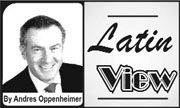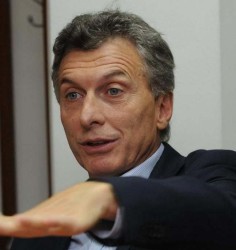After spending a week in Argentina, I concluded that there are six reasons why President Mauricio Macri — who took office a month ago after 12 years of radical populist governments — is off to a very good start.
 First, Macri’s centre-right government has freed currency controls, a measure imposed by the previous government that had contributed to paralyzing the economy over the past four years. While many feared that lifting currency controls would unleash a massive flight to the dollar, drive up the price of the US currency and make imports more expensive, it didn’t happen. On the contrary, the US dollar was trading at about 14 pesos this week, below its price before Macri took office.
First, Macri’s centre-right government has freed currency controls, a measure imposed by the previous government that had contributed to paralyzing the economy over the past four years. While many feared that lifting currency controls would unleash a massive flight to the dollar, drive up the price of the US currency and make imports more expensive, it didn’t happen. On the contrary, the US dollar was trading at about 14 pesos this week, below its price before Macri took office.
Second, Macri reduced and in some cases eliminated his predecessor Cristina Fernández de Kirchner’s high taxes on agricultural exports. In recent years, Fernández’s export taxes — especially a 35 per cent government levy on soybean exports — had led Argentina’s biggest agricultural exporters to move their operations to Uruguay, Paraguay and other neighbouring countries. Now, many of them are vowing to return to Argentina.

Third, Macri has reshuffled the country’s discredited INDEC government statistics agency, which was used by the Kirchner government to systematically lie about the country’s real inflation and poverty rates.
The INDEC had become an international laughing stock. Even the International Monetary Fund had taken the unusual step of refusing to accept the Fernández government’s official statistics, which placed inflation at 9 per cent when independent economists placed it at more than 25 per cent.
What’s more, the Fernández government’s phony statistics discouraged investments. A hotel owner told me that, like most other business people, he had stopped investing in his business several years ago because he didn’t trust government figures and could thus not estimate his future earnings. Now, with more realistic economic projections, he plans to modernize his hotel’s infrastructure and furniture.
Fourth, Macri has announced plans to reinsert Argentina in the global economy, seeking free trade deals with the European Union and a closer relationship with the Alliance of the Pacific, the group of open economies made up of Mexico, Colombia, Peru and Chile.
Macri has announced that he will attend the World Economic Forum in Davos later this month. It would be the first time in 12 years that an Argentine president speaks at the annual mega-meeting of world investors.
While Argentina has a terrible reputation among foreign investors because of its repeated defaults, and while Macri must still solve his country’s ongoing dispute with US holdout creditors before he can expect a wave of major foreign investments (his government started its first negotiations with creditors on Wednesday), he has something working in his favour: There is a current vacuum of economic stars in the developing world, and Argentina could become one by default.
China, Russia and Brazil’s economies are hurting, and Mexico and India are not taking off as many expected. While Argentina is smaller, the Macri government could turn it into a mini-star of the emerging world.
Fifth, contrary to expectations that she would be able to make life impossible for Macri from the very start, former president Fernández may not be as politically strong as many feared. Her ‘Peronist’ party is fractured, and many state governors who depend on Macri for much-needed central government subsidies show no willingness to antagonize the new president.
Sixth, Macri has signalled a major change in Argentina’s foreign policy, distancing the country from Iran and Venezuela, and re-establishing Argentina’s support for human rights and democracy. Under Fernández, Argentina had almost automatically supported dictators and human rights abusers around the world.
With Brazil, South America’s biggest country, politically weakened by an economic and political crisis, Argentina’s shift to a pro-democracy and human rights foreign policy is likely to pull Chile, Uruguay, Paraguay, Peru and other countries in that direction. Without much fanfare, Macri has become a key figure in regional affairs.
My opinion: Macri still faces difficult tests, such as reducing the massive government spending incurred by his predecessor, who gave make-believe government jobs as political handouts to hundreds of thousands of people who never showed up to work but are still on the government payroll. The new president must reduce public spending before his 100-day political honeymoon is over. But, overall, he is off to a very good start.




